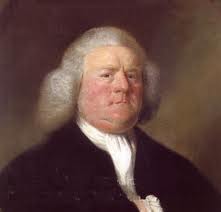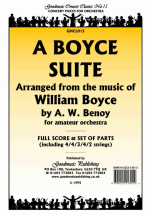A Boyce Suite
Buy this item (in stock)
Product ID: GM1 CL015
By William Boyce
Publisher:
Goodmusic
Arranger:
Benoy
Series:
Concert Classics
Genre:
Baroque
Line Up:
Symphony Orchestra
Duration:
10:00
Level: 3
Set & Score
This item is in stock
About this item
This music has been taken from three of Boyce's "Royal Birthday" Odes. Movement 1 from Ode for His Majesty's Birthday 1755, movement 2 from the 1768 ode, and movements 3 and 4 from the 1772 ode.
The score has been designed so that it may be played by strings only.
Instrumentation
2 Flutes, 2 Oboes, 2 Clarinets in Bb, Bassoon 2 Horns in F, 2 Trumpets in Bb, 2 Trombones, Percussion (triangle, bass drum) Strings (Violin 1, Violin 2, Viola, Cello, Bass)
Reviews and rating
No review available, be the first to write one!

Composer
William Boyce (1711-1779)

William Boyce (baptised 11 September 1711 – 7 February 1779) is widely regarded as one of the most important English-born composers of the 18th century.
Born in London, Boyce was a choirboy at St Paul's Cathedral before studying music with Maurice Greene after his voice broke. A house in the present choir school is named after him. His first professional appointment came in 1734 when he was employed as an organist at the Oxford Chapel. He went on to take a number of similar posts before being appointed Master of the King's Musick in 1755 and becoming one of the organists at the Chapel Royal in 1758. One of his students was the prodigy Thomas Linley.
When Boyce's deafness became so bad that he was unable to continue in his organist posts, he retired and worked on completing the compilation Cathedral Music that his teacher Greene had left incomplete at his death. This led to Boyce editing works by the likes of William Byrd and Henry Purcell. Many of the pieces in the collection are still used in Anglican services today.
More info about the composer...



 Click above to view samples
Click above to view samples
